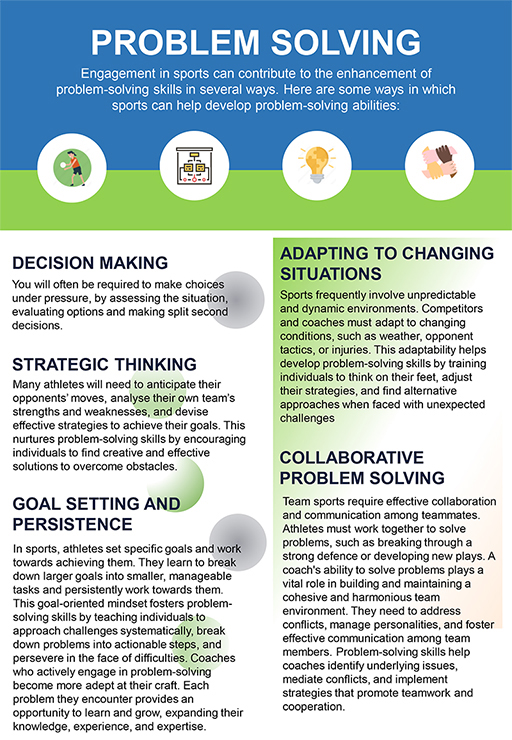2 From hurdles to triumph – problem-solving in sport
Engagement in sports can contribute to the enhancement of problem-solving skills in several ways. Overall, problem-solving in sport develops athletes’ ability to think critically, make informed decisions, adapt to changing circumstances, and overcome challenges. These skills are not only valuable on the field but also in other aspects of life. Problem-solving is also a vital skill for coaches as it enables them to work through complex situations, optimise performance, handle pressure, foster team dynamics, plan for the future, and continue growing as effective leaders in the world of sports.
Activity 2 Solving problems on the field
- Familiarise yourself with this infographic which proposes several ways in which engaging in sport can contribute to the enhancement of problem-solving skills.
- Using each heading and subsequent explanation, record in the text box below specific examples of how you have displayed these within your own sporting context. Try to think about this from a layered perspective: What was the problem? What did you do to solve it? What was the outcome?
Discussion
Problem-solving might seem like quite a daunting skill given that it is often driven by the unknown. However, hopefully you have noted several ways in which you are already developing this skill through your engagement in sport. By reflecting on the problems you encountered, the actions you took, and the resulting impact, you are building a repository of highly specific examples that can effectively demonstrate and illustrate this skill to a broader audience.
Just like in sport, problem-solving is an essential employability skill because it allows individuals to effectively navigate challenges and find solutions in the workplace. This skill is highly valued by employers as it shows your ability to:
- Be adaptable
- Be innovative and creative
- Make sound decisions
- Collaborate with others
- Improve efficiency and productivity
- Facilitates continuous improvement
- Identify development needs
These skills are applicable across various industries and job roles (Singh et al., 2013), making them crucial for employability and career advancement.


